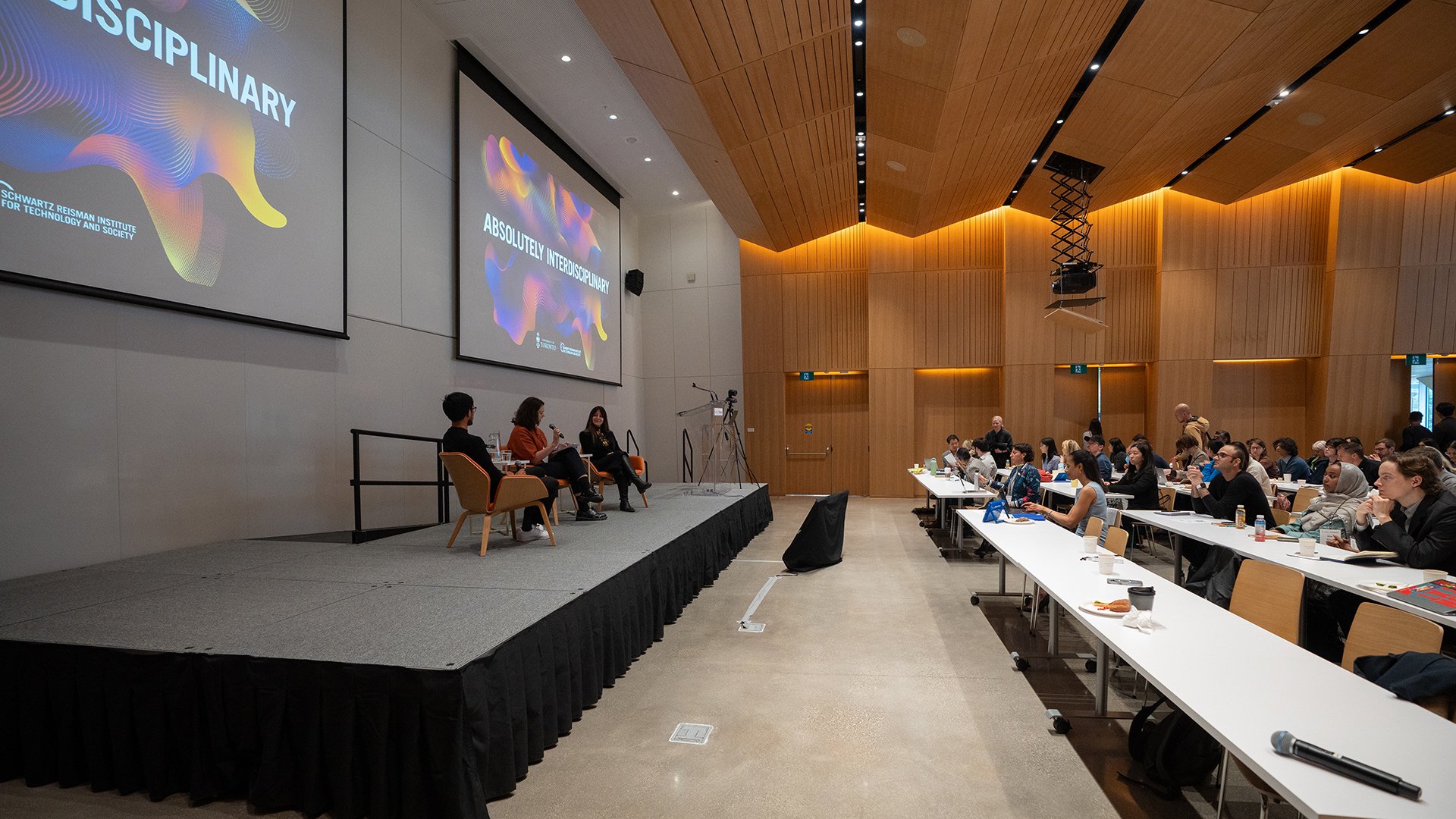WHAT’S HAPPENING
Here’s what we’re thinking about, talking about, and working on at the Schwartz Reisman Institute.
When the algorithm is wrong: A new partnership calls out racism in AI systems
A new partnership co-led by Karina Vold is confronting racism in AI systems—highlighting how tools like facial recognition and LLMs disproportionately harm Black and racialized communities, and calling for greater public awareness and equitable governance of AI in Canada.
AI companions: Regulating the next wave of digital harms
From AI chatbots marketed as digital partners to voice assistants designed for intimacy, these systems promise connection while raising urgent questions about privacy, manipulation, and digital addiction.
Absolutely Interdisciplinary 2025 explores new frontiers in AI research
At SRI’s annual conference, participants discussed future directions and key challenges in AI research, including the complexities of aligning advanced AI with human values and interdisciplinary perspectives on AI safety.
Absolutely Interdisciplinary returns to explore new frontiers in AI research
The Schwartz Reisman Institute’s annual academic conference Absolutely Interdisciplinary returns for 2025 to explore interdisciplinary approaches to AI governance, risk and safety.
SRI partners with Data Sciences Institute on “Toward a Fair and Inclusive Future of Work with ChatGPT”
Despite the growing use of ChatGPT, we lack a method to evaluate its performance and potential risks. SRI Associate Director Lisa Austin, Faculty Fellow Shion Guha, and Faculty Affiliates Anastasia Kuzminykh and Shurui Zhou are setting out to study and analyze the impact of generative AI on a wide range of communities. Learn more about "Toward a Fair and Inclusive Future of Work with ChatGPT."
From mourning to machine: Griefbots, human dignity, and AI regulation
Griefbots are artificial intelligence programs designed to mimic deceased individuals by using their digital footprint. Griefbots raise significant concerns about data collection and implications to human dignity. This article explores the digital afterlife industry and the ethical and legal challenges it presents, including a consideration of health, privacy, and property laws in Canada.
Schwartz Reisman Institute announces new faculty affiliates for 2024-25
Get to know the 15 new faculty affiliates joining the SRI research community for the 2024–25 academic year. The new cohort of affiliates has expertise in a variety of fields across social sciences, humanities, and STEM disciplines, including geography, psychology, information studies, management, criminology, sociology, history, cultural studies, public health, physiology, pharmaceutical sciences, computer science, and engineering.
All about Bill C-70, the Canadian government’s attempt to counter foreign interference
Although foreign interference did not impact the results of Canadian elections in 2019 and 2021, it ‘stained’ the electoral process, undermining public confidence in Canada’s democratic institutions. What measures does Bill C-70 (“An Act respecting countering foreign interference”) take to bolster Canadian confidence in elections? And how might it apply to the use of AI in our elections?
The terminology of AI regulation: Ensuring “safety” and building “trust”
We hear certain terminology used frequently in efforts to regulate artificial intelligence. But what do we mean when we talk about “safety” and “trust”? Are advanced artificial intelligence (AI) systems a threat to our sense of safety and security? Can we trust AI systems to perform increasingly critical roles in society? Precise and useful understandings of these terms across diverse contexts are a crucial step toward effective policymaking.
SRI’s annual conference, Absolutely Interdisciplinary, returns in May of 2024
The Schwartz Reisman Institute’s annual academic conference will take place May 6–8, 2024, with select sessions taking place in the newly-completed Schwartz Reisman Innovation Campus located in the heart of Toronto’s Discovery District. Speakers include: Peter Railton, Harper Reed, Huili Chen, Ray Perrault, Gillian Hadfield, and more.
Automated decision-making in courts of law: A conversation between Nathalie Smuha and Abdi Aidid
Can algorithmic decision-making help clear backlogs in the courts, and is this a justified use of the technology? Do automated systems make “better” decisions than human judges, and what do we mean by “better”? Should legal professionals be involved in the design of automated systems, and if so, how? Nathalie Smuha and Abdi Aidid discuss these and related questions.
Five key elements of Canada’s new Online Harms Act
Canada’s federal government has released the latest draft of its online harms bill, otherwise known as Bill C-63. Below, Schwartz Reisman researchers take us on a tour through key aspects of the bill, including its taxonomy of harms, new expectations and requirements for social media platforms, and new kinds of protections for children and youth online.











